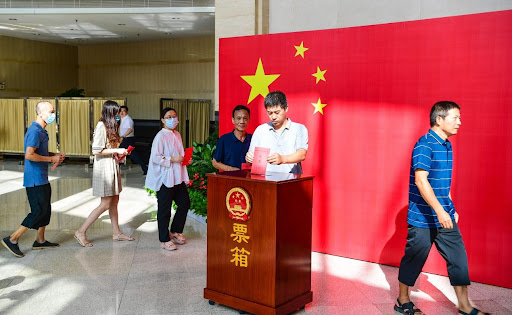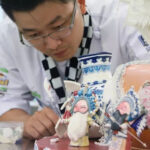In Shanghai, a mail courier, also a deputy to the National People’s Congress (NPC), is running all
over the city to survey food deliverymen and employees in other new professions. By delivering
their voices to the NPC, he is bringing more labor security to the people in flexible employment.
In Wenling, east China’s Zhejiang province, a consultation meeting was held on a renovation
project of old residential complexes in a neighborhood. The meeting, joined by a number of
government officials, residents in the neighborhood, and professionals, delivered a renovation plan
that pleased all parties.
These two stories, which are told in a recently published documentary titled “Pursuing Common
Values of Humanity: Chinese Stories on Democracy, Freedom and Human Rights,” exactly
demonstrate the vitality of the Chinese democracy and mirror the Chinese wisdom that lights up
the whole-process people’s democracy.
As it is said in the white paper China: Democracy That Works published by the State Council
Information Office, China’s democracy is thriving alongside those of other countries in the garden
of civilizations.
China has created and developed whole-process people’s democracy in line with its national
conditions. This is a form of democracy with distinctive Chinese features which at the same time
reflects humanity’s universal desire for democracy. It has fueled the development of the country
and driven the revitalization of the nation. It has contributed a new model to the international
political spectrum.
In promoting democracy, China has undergone a difficult process of selection, experimentation,
practice and development. Whole-process people’s democracy contributes China’s ideas and
solutions to the political progress of humanity.
A sound and genuine democracy must allow the people to become masters of the country. It must
allow them to enjoy the right to stand for election, the right to vote, and the right to extensive
participation. It must allow them the right to express their expectations and the right to have those
expectations.
China did not follow the established path of Western countries in its modernization drive.
Similarly, China did not duplicate Western models of democracy, but created its own. Now, the
entire Chinese population, almost one fifth of the world’s total, enjoys extensive rights and
freedoms. This is most encouraging to developing countries and greatly enhances their confidence
in developing their own democracy. China’s new approach to democracy represents a significant
contribution to international politics and human progress.
Whole-process people’s democracy offers Chinese experiences for other countries to develop the
most suitable form of democracy in accordance with their own characteristics and realities.
China’s democratic practices indicate that only democracy rooted in a country’s unique social
environment has proven to be reliable and effective, and can thrive and progress.
Countries can borrow from the successful experience of others and develop forms of democracy
suited to their own modernization process, but they should not simply duplicate other systems or
models.
China never seeks to export the Chinese model of democracy. On the contrary, it firmly supports
the independent choice by every country of its own path to democracy, and opposes any
interference in others’ internal affairs on the pretext of “bringing democracy”.
Democracy manifests itself in two dimensions: On a national level, it refers to the people’s status
as masters of their own country; on an international level, it refers to the democratic relations
between nations.
China is a faithful and exemplary actor in pursuing, exploring and practicing democracy. It
endeavors to increase democracy both within its own territory and between nations.
From proposing to build a community with a shared future, to promoting cooperation and
common progress in economy and science, and from pursuing the greater good and shared
interests and applying the principles of sincerity, affinity, good faith and real results in
strengthening cooperation with other developing countries, to advancing the Belt and Road
cooperation, China has always been standing on the right side of history.
Promoting democracy in international relations, championing peace, development, cooperation
and mutual benefit, and building a new model of international relations, China is making the
global governance system fairer and more equitable.



